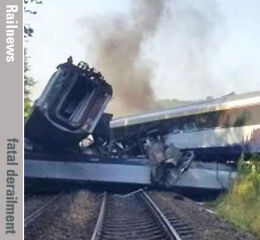Posted 10th March 2022 | No Comments
Drains at Carmont crash site ‘not built as designed’

THE final report into the fatal derailment of a ScotRail HST near Stonehaven on 12 August 2020 has concluded that the drains which should have diverted water away from the track had not been properly built. The Rail Accident Investigation Branch found that drainage contractor Carillion had not reported unauthorised variations to Arup, which had designed the system.
As a result, exceptionally heavy rain caused overflowing drains to wash debris on to the railway in the path of an HST which was returning to Aberdeen after it had been stopped by a landslip further south. It was one of many incidents of flooding and landslips affecting the railway in Scotland that morning.
Several of the derailed vehicles were sent plunging down an embankment at Carmont and fire broke out in one coach, while the cab was torn from the leading power car. Three people on board, including the driver and the conductor, were killed.
The RAIB has highlighted gaps in Network Rail’s procedure for maintaining records about changes to its infrastructure, a lack of guidance or additional support for control room staff during a very busy time, a failure to recognise that existing measures did not fully address the risk from very heavy rain, and also the absence of an effective strategy to deal with the general threat to the stability of earthworks in extreme weather.
The report also noted that HSTs, designed in the late 1970s, are not as crash-resistant as newer trains, and commented that it was ‘more likely than not’ that the consequences of the derailment might not have been so bad if the train had met modern crashworthiness standards.
The RAIB has made 20 recommendations, many to Network Rail. Others are intended for the RSSB, the Rail Delivery Group or rolling stock operators.
Network Rail chief executive Andrew Haines said: ‘This report makes clear that there are fundamental lessons to be learnt by Network Rail and the wider industry. As well as expressing our deep sorrow and regret at the loss of the lives of Christopher Stuchbury, Donald Dinnie and Brett McCullough, it’s important that we acknowledge it should not have taken this tragic accident to highlight those lessons. We must do better and we are utterly committed to that. In the 18 months since the accident, we have inspected similar locations and drainage systems across the length and breadth of the country and the added insight the RAIB has provided today will help us in our efforts.’
The drivers’ union ASLEF described the report as ‘damning’. General secretary Mick Whelan said: ‘This report makes for difficult reading, not least for the families of those who died and were injured. The failures identified in this report are so bad that we believe this must be a watershed moment in the way we ensure the safety of passengers and staff on our railway network.’
His colleague Kevin Lindsay, ASLEF’s full-time organiser in Scotland, added: ‘Network Rail and Abellio ScotRail failed the staff and the passengers who were on the train and they must be held to account. This should start with Alex Hynes; given his involvement in both Network Rail and Abellio ScotRail, his position is untenable, and he must resign with immediate effect.
‘Network Rail and Abellio ScotRail must be pursued in the courts. Carmont represents endemic corporate failure and, for justice to prevail corporate homicide/manslaughter laws should be used.’
The union is also calling for a public inquiry, and for all HSTs to be withdrawn by 12 August 2023.
RSSB chief executive officer Mark Phillips said: ‘Our thoughts are with the families and friends of those tragically killed and injured in the accident at Carmont. The Rail Safety and Standards Board will address recommendations placed on it in RAIB’s report, and share learnings with the rail industry. While Britain’s railways have a very good safety record, this catastrophic incident shows we must not be complacent. RSSB will work with industry members to improve safety and promote better understanding of risk for the future.’
HM chief inspector of railways at the Office of Rail and Road Ian Prosser said: ‘Our own joint investigation with Police Scotland and British Transport Police is making good progress and we anticipate handing over the final report to the Crown Office and Procurator Fiscal Service in the coming months.’
